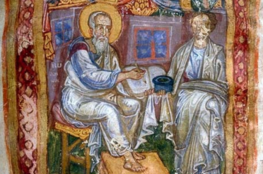One could say, from a certain point of view, that there are two kinds of theologians; some say: let us reread Scripture, Saint Paul, etc.; let us examine tradition; let us listen to the great classical theologians; let us not forget to pay attention to the Greeks; let us not neglect history; let us situate ourselves in this vast context and understand the ecclesiastical texts according to it; let us not fail, either, to inform ourselves about the problems, needs, and difficulties of today, etc.—The others say: let us reread all of the ecclesiastical texts of these last hundred years, encyclicals, letters, occasional speeches, decisions made against something or other, monita of the Holy Office, etc.; from all of that, without dropping any of it or correcting the least word, let us make a mosaic, let us push the thought a little farther, let us give to each assertion a stronger value; above all, let us not look at anything outside; let us not lose ourselves in the new research on Scripture or tradition or a fortiori on any recent ideas, which might make us relativize our absolute.—Only a theologian of the second type is considered to be “sure” in a certain milieu.
“Hoc non fundatur in documentis” [This is not based on the [ecclesiastical] documents]: I have heard that more than once. The conclusion to be drawn from it: it is not a sure doctrine; it is a doctrine that is advisable to dismiss, even if it has the support of Scripture and tradition. Only the ecclesiastical documents count, especially the most recent ones. The least words of these documents are received as absolute. In response to any objection against any particular idea or formula or one-sided phrase: “Ipsa verba desumpta sunt ex documentis; sunt in talibus litteris encyclisis; in tali oratione pontificali” [These expressions are taken from the ecclesiastical documents; they figure in some particular encyclical letter or other; in some pontifical discourse or other].” So no one can do anything any longer but submit.
There is in this a very excessive positivism of method and fundamentalism of spirit—which could provoke as a reaction, among some, a contempt for all writing of the magisterium.
– Henri de Lubac, “September 30, 1961,” Vatican Council Notebooks, vol. 1 (Ignatius Press 2015), pp. 93-94.
In preparing for a panel talk based around Fr. Thomas Joseph White’s excellent First Things article, “Catholicism in an Age of Discontent,” I found myself skimming back through Fr. Henri de Lubac’s Vatican II notebooks, particularly his critical remarks concerning the so-called “Roman theologians.” It is generally expected that my contribution to the panel will be along traditionalist lines with the other two panelists defending (albeit with some possible reservations) the “new theology” and ressourcement (“return to the sources”) movement to which de Lubac belonged. Truth be told, I am not sure what “angle” I will take, or if I will even take one at all. For as White’s article itself makes clear, the story of pre-/post-Conciliar Catholic theology is not as simple as the polemicists of our age maintain. There is an undeniable childishness found in de Lubac’s description of his theological adversaries in the run-up to Vatican II; but that doesn’t make his description wholly inaccurate either. Today, there is a culture of “positivism of method and fundamentalism of spirit” found within certain traditional Catholic circles which cannot be dismissed lightly. At the same time, a nauseating triumphalism permeates the work of too many post-Conciliar theologians who wish to maintain the falsehood that Vatican II dogmatized the theological projects of a handful of men whose works were once eyed with understandable suspicion.
As a Greco-Catholic who has never had a high fondness for the excesses of manualism nor believes that the theology of the Church can be reduced to St. Thomas Aquinas’s Summa and the commentarial tradition, I am not unsympathetic with de Lubac’s desire to take a broader view of the Church’s tradition, one built by the Greek and Syrian East just as it was built by the Latin West. However, as Fr. Peter Totleben observed in an old thread on a previous iteration of this web-log, one of the perils of ressourcement is the tendency for some to use this-or-that passage in a Church Father or two in order to perform an end-run around the settled magisterium of the Church. In the hands of unscrupulous souls, ressourcement becomes just another tool of dissent; it purports to uphold tradition while simultaneously tearing it down. Consider Elliot Milco’s words on the matter.
[T]here is an overall difficulty in the implications of the Ressourcement position for the proper approach to the Tradition as a whole. If these new theologians are correct in claiming that the main threads of theological reflection as practiced over the past thousand years are largely fruitless and disposable, and that “authentic theology” needs to be recovered from some hidden trove where it has lain undiscovered in the writings of the Greek Fathers, then it becomes difficult to tell how one is supposed to perform this rediscovery. Doesn’t one become a kind of highly-educated protestant? Isn’t the entire function of the tradition between the Fathers and the Present that it has conveyed the former reliably to the latter together with all necessary clarifications and developments to render their testimony intelligible in the present time? And what are we to make of the innumerable commendations by great Popes and Saints for this supposedly dry and barren mode of theological reflection? Could it be that Ressourcement is just an excuse to abandon the Catholic tradition altogether, and reconstruct a new one according to one’s tastes and creative inclinations?
Of course, it is possible to warp Milco’s line of critique into an excuse to ignore Scripture, the Church Fathers, and the non-Latin patrimony of the Church—which, as noted, is a real problem for some traditional Catholics (though not for Milco himself). There is no obvious reason one can’t defend the Catholic renaissance of the 19th and early 20th centuries while drinking deeply from the theological orations of St. Gregory Nazianzus or the ascetical homilies of St. Isaac the Syrian. A Greco-Catholic should feel perfectly comfortable in joining Ukrainian Catholic Patriarch Cardinal Josyf Slipyj in studying the Angelic Doctor and seeing his theology as a bridge between East and West just as a Latin Catholic should see the same in the works of St. John Damascene. Why this broadmindedness seems so difficult to attain to in a day and age of unprecedented access to the Church’s vast intellectual and spiritual treasures isn’t entirely a mystery; ideological black boxes are safe havens. Noting that doesn’t make this closeminded reality any less unsettling, however.


